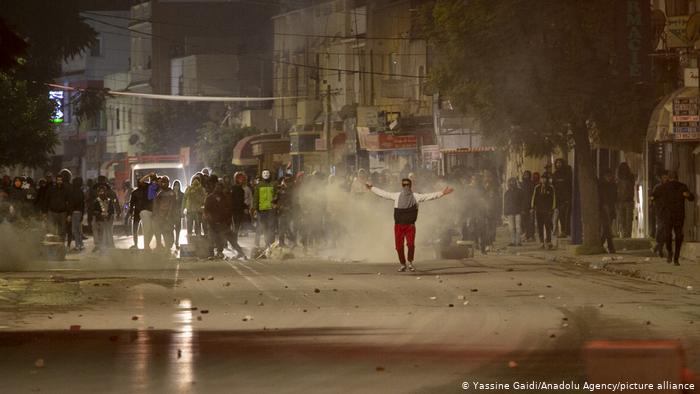Tunis and at least five other Tunisian cities saw violent demonstrations linked to the 10-year anniversary of the Jasmine Revolution that ousted the country's longtime ruler.
Tunisian security forces arrested dozens of young people during consecutive nights of disturbances in several cities, a government spokesman said Sunday.
The protests took place as Tunisia marks the 10th anniversary of the revolution that toppled the late President Zine El Abidine Ben Ali and sparked the Arab Spring uprisings.
Where did the clashes take place?
Violent protests took place in several areas of the capital, Tunis, and the seaside city of Sousse, among others.
Interior Ministry spokesman Khaled Hayouni told the AFP news agency that dozens of young people, mostly aged between 14 and 17, were held after they took to the streets. He accused them of intending to loot and vandalize shopfronts and cars overnight.
الناطق الرسمي باسم الادارة العامة للأمن الوطني وليد حكيمة "القوات الامنية قامت بإيقاف 242 شخصا في كامل تراب الجمهورية ، تورطوا في أعمال تخريب ومحاولات استيلاء ونهب املاك عامة وخاصة الليلة الماضية" #وكالة_وات
— Agence Tunis-Afrique-Presse (@AgenceTAP) January 17, 2021
AgenceTAP put the number arrested at 242, citing a spokesman for the National Security Directorate.

Witnesses in Sousse said security forces fired tear gas to disperse hundreds of angry protesters who blocked roads and burned tires.
There were also night protests and riots in the north of the country.
Tunisia is set to exit a four-day lockdown amid a sharp rise in coronavirus cases. The country has been under a nighttime curfew since October.
What's driving the protests?
A decade after the Jasmine Revolution, Tunisia has made a smooth transition towards democracy, but its economy remains on the verge of bankruptcy.
Tunisia's GDP shrank by 9% last year, consumer prices have spiraled and one-third of young people are unemployed.
The key tourism sector, already on its knees after a string of deadly jihadi attacks in 2015, has been dealt a devastating blow by the coronavirus pandemic.
Tunisia has been rocked by months of anti-government protests.
According to the Tunisian Forum of Economic and Social Rights, more than 1,000 demonstrations took place in November alone.
Months of sit-ins have paralyzed oil and phosphate production for months, putting holes of billions of dollars in the country's budget.
The protests pose a challenge for the government of Hicham Mechichi, who on Saturday reshuffled the cabinet, installing new interior, justice and energy ministers.
Latest Stories
-
Don’t appoint a new EC Chair; allow Jean Mensa to work – Prof. Stephen Adei to Mahama
7 minutes -
Bayer Leverkusen’s Jeremie Frimpong arrives in Ghana for visit
31 minutes -
‘It will be disastrous if Mahama removes the Chief Justice’ – Prof. Stephen Adei
33 minutes -
Jean Mensa must step down as EC Chair – APC and Movement for Change assert
52 minutes -
Akufo-Addo calls on police to refine strategies to avoid prolonged electoral unrest
56 minutes -
Only NPP looting brigade unhappy about ORAL – Ablakwa
58 minutes -
CSIR-SARI introduces integrated soil fertility management technology to boost maize production
59 minutes -
Ghana’s indigenous agribusiness faces challenges impacting economic growth – Dr. Azinu
1 hour -
41-year-old man arrested over illegal power connection
1 hour -
65-year-old man plans to walk over 250-km Kumasi-Accra journey for Mahama’s swearing-in
1 hour -
Woman dies after being set on fire on NYC subway
3 hours -
Elon Musk’s curious fixation with Britain
3 hours -
EBID wins the Africa Sustainability Award
5 hours -
Expansion Drive: Takoradi Technical University increases faculties
9 hours -
SHS heads demand payment of outstanding funds before reopening of schools
10 hours

